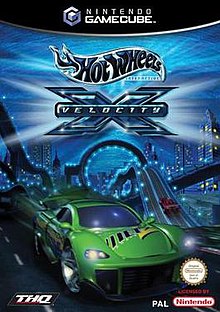| Hot Wheels: Velocity X | |
|---|---|
 PAL region GameCube cover art | |
| Developer(s) | Beyond Games[a] |
| Publisher(s) | THQ |
| Director(s) | Christopher Salmon |
| Producer(s) | Mark Morris Brian Ulinger |
| Designer(s) | Jeff Peters Neil Melville |
| Programmer(s) | Daryl Tung Bruce Johnson (PC) Kennett Galbraith (PS2) Ryan McBride (GCN) |
| Artist(s) | Neil Melville |
| Writer(s) | David Wohl |
| Composer(s) | Rick Jackson |
| Series | Hot Wheels |
| Engine | Brainstorm[1] |
| Platform(s) | Windows Game Boy Advance PlayStation 2 GameCube |
| Release | WindowsGame Boy AdvancePlayStation 2GameCube |
| Genre(s) | Vehicular combat, racing |
| Mode(s) | Single-player, multiplayer |
Hot Wheels: Velocity X (released as Hot Wheels: Velocity X – Maximum Justice for the PlayStation 2) is a 2002 vehicular combat racing game developed by Beyond Games and published by THQ based on Mattel's Hot Wheels line of scale model cars. The story follows Maxwell "Max" Justice, a teenage street racer, and his efforts to thwart the Monument City Underworld crime ring intent on stealing the Velocity X formula. Players assume the role of Max, competing in street races and demolition derbies across five locations in the greater metropolitan area.
Velocity X was released in North America and PAL regions for Windows, PlayStation 2, and GameCube. It is the sixteenth video game based on the Hot Wheels intellectual property, and the third home console Hot Wheels video game release. A Game Boy Advance version of the game developed by Saffire was released in conjunction with the GameCube version, and was one of the first titles to use the GameCube's Game Link cable to unlock bonus content.[2]
Velocity X received mixed reviews across all platforms upon release, with praise for its variety of Hot Wheels cars and game modes, and criticism for its mission structure, vehicle controls, stunt mechanics, and graphical fidelity. Velocity X would become the final title developed under the Beyond Games name, as the studio would undergo restructuring after The 3DO Company filed for Chapter 11 bankruptcy in 2003.[3]
Cite error: There are <ref group=lower-alpha> tags or {{efn}} templates on this page, but the references will not show without a {{reflist|group=lower-alpha}} template or {{notelist}} template (see the help page).
- ^ "Hot Wheels Shines at THQ Editors' Day". Beyond Games. February 18, 2002. Archived from the original on November 20, 2002. Retrieved September 18, 2023.
- ^ Cite error: The named reference
NPGBAwas invoked but never defined (see the help page). - ^ Hawken, Kieren (November 2016). "From the Archives: Beyond Games". Retro Gamer. Vol. 160. Future. p. 69.